Freddy Beans here with an interview of Dylan Avery (LOOSE CHANGE series) for his documentary on police brutality BLACK AND BLUE.
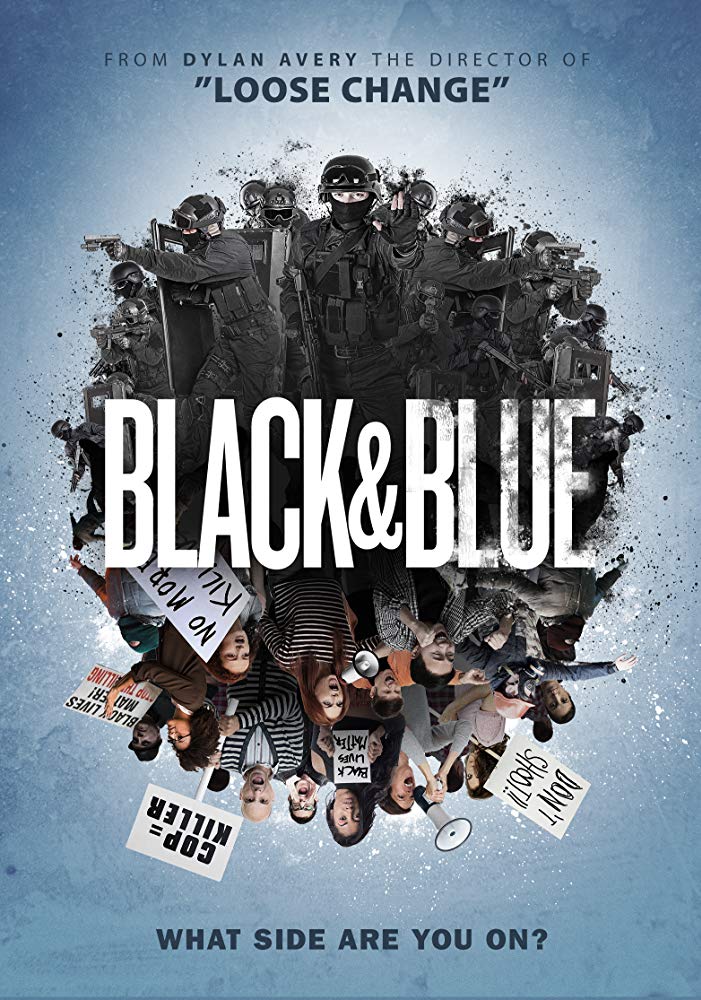
BLACK AND BLUE is an exploration into the subject of police brutality. In the end, I was left with a desire to do more as a concerned citizen. I appreciate how BLACK AND BLUE never chose a side and instead gave you real time instances, making you think outside your comfy box for solutions. If enough people want a solution one becomes available, or that’s what I tell my children anyway.
I found BLACK AND BLUE to be an informative documentary and as you will read in the interview, I can’t wait for his next one on CBD. Until that hits theaters, here’s the interview.
____________
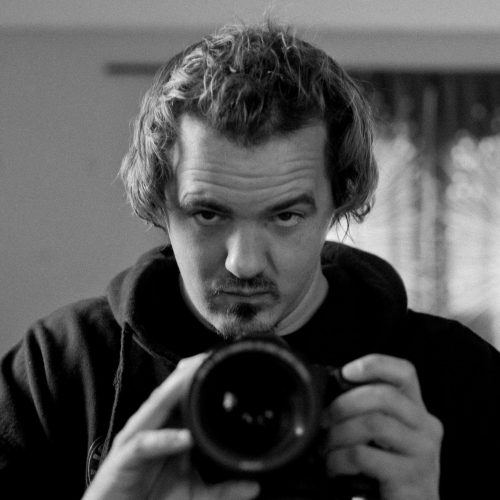
Freddy Beans: How are you doing today Dylan?
Dylan Avery: I am doing well, how are you?
FB: I’m fantastic, thanks!
I watched BLACK AND BLUE recently. I found it quite informative with your passion carrying it in parts. At the end, I was left wanting to do more for my community and my people. I suppose that’s the type of reaction you’re looking for?
DA: Yes, that’s great! It was tough to come up with the right words to say at the end of the film. When all else fails, call to action, so I tried to do that. It seems like it worked for you, so that’s great.
FB: Absolutely. It leaves you with this residual desire to do more. I think that encompasses the feelings I was left with. It was definitely a fun documentary, even though the subject matter isn’t necessarily “fun.”
In your words, how would you describe, with a quick synopsis, BLACK AND BLUE for our readers?
DA: Absolutely! It’s interesting when I made the documentary police brutality wasn’t the big subject is it today. It sort of became one after. I recognized a problem and felt the way to address it in my personal way was to make a documentary. I had this structure written out but the more I filmed and I met people and got into their stories. Realizing the lasting effects these kinds of events have on people, ended up becoming a focal point of the production. There’s been a lot of information about police brutality in the last few years, especially in Ferguson and Baltimore and I wanted a personal look into the shootings. My goal going into this was to really capture what goes on behind the headlines in the LA times and the homicide section. I saw a huge disparity between articles written up when someone was killed and what I learned about them speaking with the affected families. There is a large gap from what families have to suffer through, to what the news is telling everyone about those very people. One of the main goals was to bridge that gap a little bit. Show that not only these are real everyday people that have been killed by the police, they’re leaving behind families, some cases their kids, or wives, etc. I wanted to show the repercussions of all these things, a piece that maybe some people haven’t been made aware of. And again thanks to former officers like Alex M. Salazar I was really able to convey what a ‘good cop’s’ perspective might be.
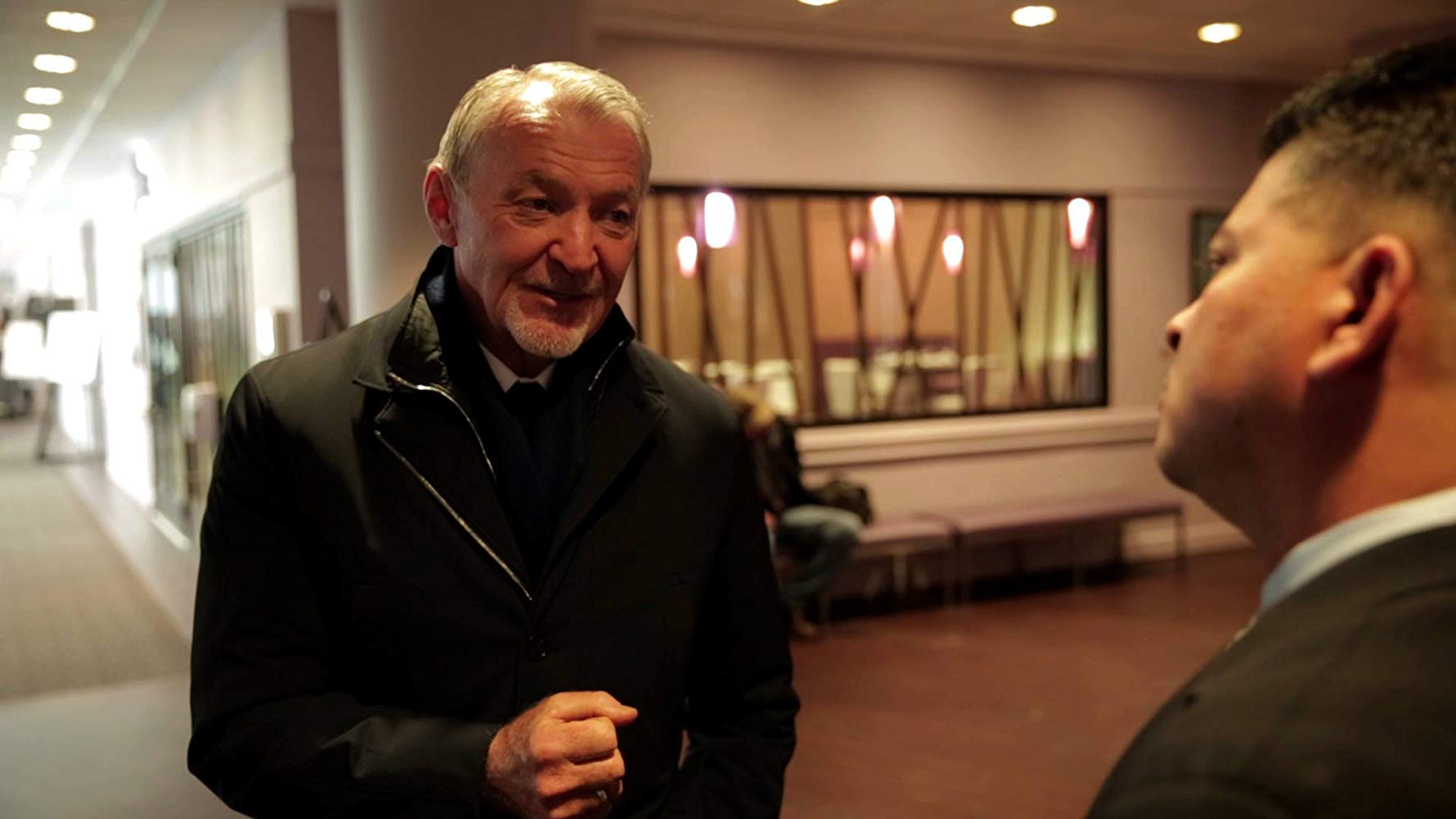
FB: Having his involvement and others lends legitimacy to the entire project.
You bring up the news. Not only does our news not portray a full story including the entire events as they occurred, you typically also find different newspapers with competing political agendas tell the same stories with their designated slants on them. It gets really convoluted and documentaries like this I think are needed to document the facts and make them relatable to everybody.
DA: Thank you! I really appreciate that!
FB: Absolutely.
For you, what was the most enjoyable piece of making this film?
DA: That’s tough. I mean there’s a real fine line between something I enjoyed doing in making the film and the fact it’s a really heavy subject matter. If I had to go with “fun” and the aspect of enjoyable, I enjoyed about every person or couple I interviewed. For straight up fun I would probably have to default to the late George Thompson. He was one of those people, you just never knew what to expect. I still really miss talking to him to this day. It was a lot of fun with George. I had filmed in LA and had done a couple interviews so I knew I needed to shoot outside of LA. I looked for an incident across the country that I could cover and as soon as I found George I was like this is the guy. This is the character you see in films that just kind of sticks with you. Going forward that was kind of the tough part, balancing the film out with people like George and all these types of things that were happening across the country. Thankfully we found ways to weave the stories together. Once things started to shake up and I was down to editing and worrying if all this was going to still work. I didn’t want to just talk about the things everyone already knew about. I’d do the film a disservice if I spent the entire thing on Ferguson and Baltimore. If I hadn’t gone to the rally for Kelly Thomas. And then through the vigil, where I met a large percentage of the families in LA. It was definitely one of the main guiding principles throughout to not forget where this all started and that was with Kelly Thomas. That made it easier to keep people like George in focus. A perfect example is more often than not wherever I would go somewhere with George he’d talk to whoever he’d be talking to and he’d point over to me and he’d point over and say this is Dylan Avery, LOOSE CHANGE director, he’s making a film about me. No matter where we were on he’d point over and tell random people who I was and what I was doing. (Laughs)
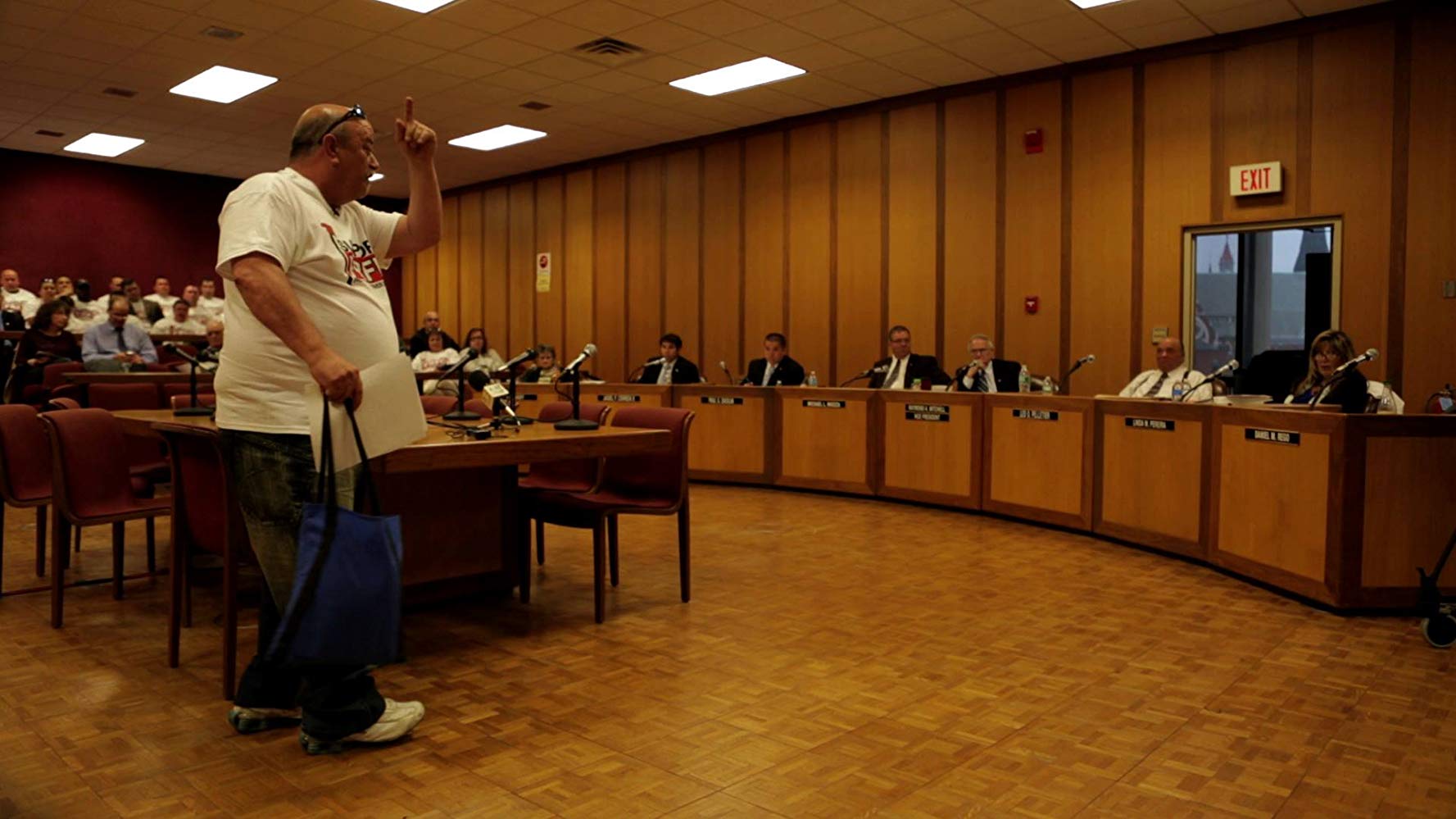
FB: (Laughs) Well, he really is that type of personality right? It definitely came across that way in the film.
DA: Yes, absolutely!
FB: The film showed his ‘larger than life’ personality and that in turn helped us feel for him.
So to play the other side of that coin, what was the hardest or least enjoyable part of the documentary?
DA: Definitely, reaching out to people that had lost their loved ones. That was by far the hardest part of filming. A lot of these families are in various stages of grieving. That was another interesting aspect I wanted to cover more of but didn’t really get the chance to, the various stages of grieving that families go through. I shot the film for 2 years and then edited it for another year. It was really interesting to have that access and see their grieving evolve through the editing. Watching someone relate and consistently break down. Having access to them through the process, there was definitely an evolution where the breakdowns were having less and less replaced with a growing strength. The tears replaced with laughter. On top of my going to these people and throwing a camera in their face and asking them about the most painful moment in their lives, a less painful but no less personal aspect of that was being in contact with these people as they go through this massive grieving process. It’s something that you truly can’t understand unless you go through it yourself.

FB: I appreciate it made you feel unease a little bit, it’s an uncomfortable and odd situation to be in, voluntary or not. The way to healing is to face what hurts, so in that vein even just going through that on camera, seeing themselves later in this film should help them with the healing process. You’ve already kind of hit on this one but what type of change are you trying to affect with this film or are you simply shining a light on a broader subject of police brutality?
DA: I guess your reaction is, while not all I’m looking for, clearly the expectation I have. Like I say at the end of the film, “There really is no one solution to police brutality. It’s a wide-ranging systemic issue that unfortunately takes a lot of roots in things that have happened in our country over several decades, which can’t simply be undone. I think with decades in the right direction, we can slowly reverse the systemic issues. I think we’ve seen a little bit of change already. Police convicted of manslaughter, where they weren’t before. I’m actually really curious to see how the grand jury went for Amber Guyger in Dallas. Someone got killed in his own apartment and the fact we still don’t’ have the officer’s toxicology results, isn’t right. I’ve heard a lot of rumors from neighbors in that complex, that she seemed like she was drunk. Most, not directly asserting it, but they heard her pounding on the door and saying “Let me in!” So I do think there’s a reason we haven’t seen the toxicology results. All that is to say, that things have changed but they also haven’t quite enough. I think by people being aware of this and trying to raise our voices whenever we can about it. If you’re worried about it then speak up about it. With enough voices, eventually, we maybe get Congress to push effective legislation through.
FB: Speaking out, is in itself, doing more than simply sitting around and bitching.
DA: It’s something!
FB: Exactly, I think complacency is kind of why we’ve gotten to where we are. You bring up there isn’t an easy solution but to simplify everything here. The police working a lot harder on their community outreach, in the old days the local cop went into say Compton and introduced himself. Talked about who he was, where he came from, what he wanted to do and got connected. Those cops gained respect for that. And maybe outing the rotten apples in their ranks right? It’s, unfortunately, something you just don’t’ see. There are obviously a lot of bad cops but you never hear the good cop outing the bad cop among them, like a Frank Serpico.
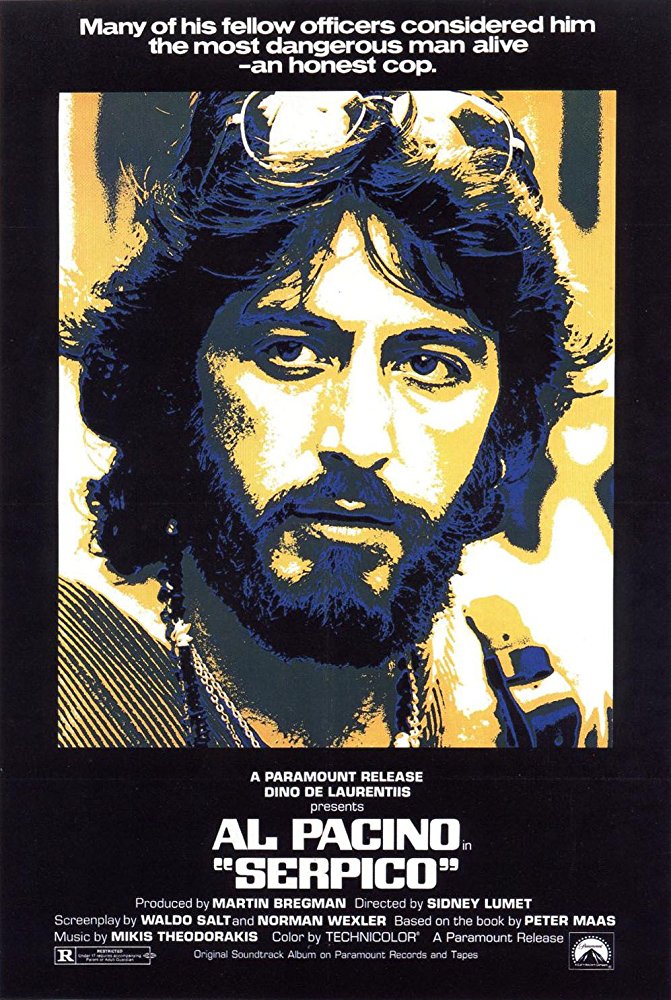
DA: Great! Right, we also have some SERPICO in the film. Not to interject but that is one of the things where Ray Lewis said exactly that. He used to go to the communities and get out of his car and just start talking to people. Hey, I’m the captain of this precinct. Let me know what I can do. Unfortunately, people like Captain Lewis are now retired and he’s now retired from activism. I’m hoping there are more people like him stepping forward that can shine a light on it, like hopefully, the film has. Hopefully, there are officers out there who will see this and will end up rising up or hope to elicit change one day. I don’t want to change people per se but if you’re in law enforcement for the wrong reasons, I don’t necessarily think there’s something wrong with trying to change that person’s opinion.
FB: To play the flipside a little, I do think society as a whole has a degradation of respect for the police officer’s role in our society. Whether that’s due to police officer’s actions or lack of we can debate all day but I think all of what we just discussed plays together. Keeping the police in effect alienated from the people they should be helping, quite frankly.
DA: I totally agree. In all walks of life, there are just bad people. And they exist on both sides. Bad people in all groups. I guess I agree with you and think respect, in general, has kind of faded over the last couple of decades.
FB: Damn you, @Twitter! (Laughs)
DA: (Laughs) Yeah, I think we’re seeing the broader repercussions to social media. And it’s not going to get easier during our lives. Law enforcement and the justice system are huge partners in society so if there’s a problem in our society, they are definitely going to be reflective of that. So, I agree there is not as much idolization. There’s still idolization but it comes in the form of Blue Lives Matter. Yet the general respect seems lacking. That’s what I have. I have total respect for the profession. I don’t think I could ever be a police officer but I absolutely respect what they do. That was one of my biggest concerns going into this, that I wasn’t making just a “Fuck the police” film. Because that was definitely not the intention.
FB: Well, I think that came across by having the police officers speak in poignant moments during your documentary. Like I said earlier that kind of gave it the legitimacy it needs, otherwise, it’s just a bitch fest right? Not to be a jerk but…
DA: But you’re right. I was very concerned about that while making it. I wanted to speak to active police officers in Rialto here outside of Los Angeles. They implemented a mandatory body camera policy. That was the talk, having officers enter communities with live body cameras. As these events and shootings seemed to really ramp up, that was one of the more meaningful reactions by a department. I was getting concerned because I need the other side of things shown or it’s a problem. Whether its active law enforcement or whatever. It was critical that I get to show that other angle. I was very worried about BLACK AND BLUE coming off as one-sided. That was definitely not something I wanted to do.
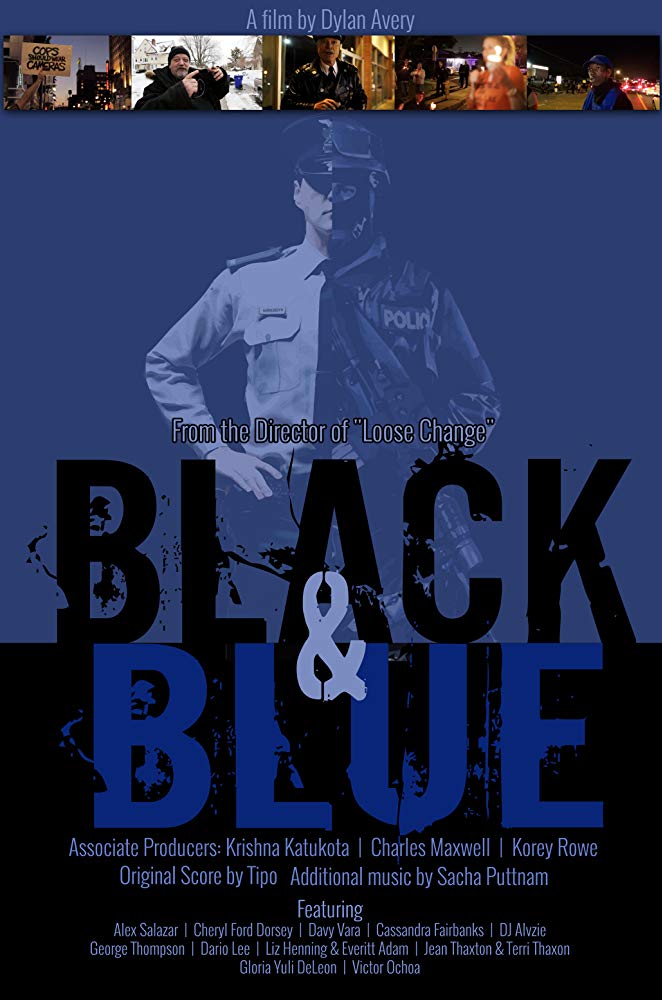
FB: Thank you for sharing all that. I think you made a passionate point while being respectful of the other side of the fence.
To change subjects here, what can you tell our readers about MAGIC MOLECULE, your next documentary basically on CBD is that correct?
DA: Yeah, that’s correct. I put up the trailer and in days it got some 30,000 views, it’s in the hands of a distributor now. Ironically, that didn’t get into Slamdance but another documentary I edited and helped produce did get in. I’m still hoping MAGIC MOLECULE gets in at South By Southwest and then there’s two other festivals here in Southern California I’ve been meaning to enter into. One way or another that should be coming out in May. I’m really excited about it. Getting to talk about that after BLACK AND BLUE it was so nice to film a movie in January, edit it in May and basically be done by July, it was a quick turnover and not nearly as stressful of a production. It was a very welcome change of pace after BLACK AND BLUE. I’m pretty excited about this one.
FB: It looks awesome.
If there’s one documentary on the planet you would recommend someone to see, not filmed by you, what is it and why?
DA: Oh man, that’s good. The first one that comes to mind is AMERICAN MOVIE. I know it’s not the answer most people would expect me to give. It’s one of those docs where every time I’ve watched it, I felt like I had to watch it again. Wondering, what did I just see? The more I watched it and the more I kind of realized the following it has, I was more drawn to it. It’s just this charming little film about this guy in the middle of nowhere with a dream. I probably loved it so much because he is a filmmaker and he’s trying to make his film. Like every other filmmaker on the planet. It’s one of those docs I can watch over and over again. There’s also a lot of subtlety in its editing that I really appreciate. It’s a really nice film. A great heartwarming story, it’s no wonder it’s a winner at Sundance. I live in the informational documentary world so maybe that’s the attraction. It makes sense that I would go and name one that isn’t that at all. If I had a 2nd choice it would be BEST WORST MOVIE, which is about TROLL 2. The actors in that are another great example of these random people with an intriguing story to tell. I guess human interest docs are my favorite.
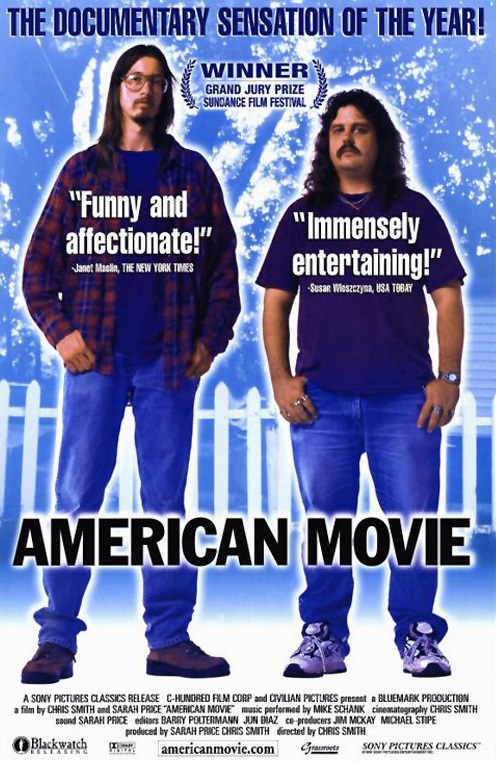
FB: I ask everyone this. Do you have a favorite horror movie?
DA: SESSION 9.
FB: Did you really just blurt out SESSION 9?
DA: I did! It just kind of came out. I don’t want to give short shrift to something like THE SHINING, but I love SESSION 9 because it’s different and not a lot of people have heard about it. With that said, I guess there are some stylistic similarities and homages to THE SHINING in there but it definitely stands on its own. I’m a big fan of abandoned buildings in different levels of decay. As soon as I heard the premise, I was like, I’m fucking on board. I didn’t’ know how good it was or what it was about. Just knowing it was filmed in an abandoned insane asylum is literally, all I need to know.
FB: All the abatement inside. Yeah, I’m just impressed you know the film and enjoy it. Most don’t. It’s one of my favorite “I bet you never heard of this one,” movies.
DA: I’m glad I said it now. You’re right it’s one of those unknown movies.
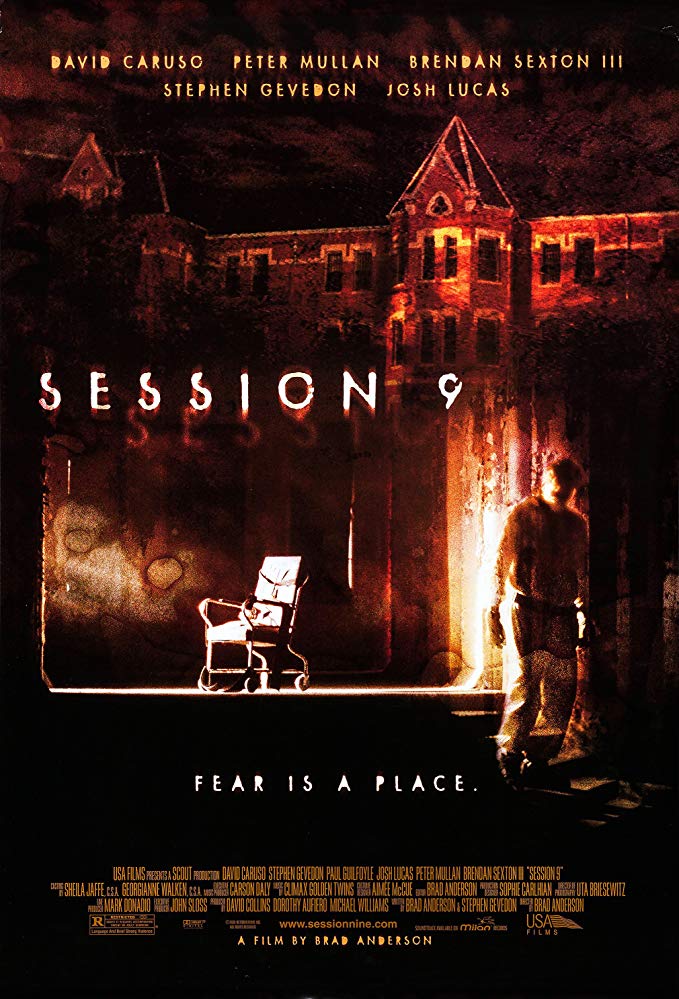
FB: SESSION 9 has a ton of haters. I’m not one of them. I’m a horror movie freak, that’s why the question comes out in the first place. The scene where the kid is running down the hall and the lights start going out, he’s still got a football field to run in either direction in what will soon be pitch black. There’s great terror and tension created in that movie. It’s really underappreciated.
DA: They really did a great job with atmosphere. They did a great job establishing mood. There’s something like one jump scare and it’s not even that bad, compared to other horror movies that rely on them. It made it a much more enjoyable film. Jump scares almost feel made for comedic effect now, something jumps up into their face and (yell in fear) OK. And I think it’s the first feature film shot digitally on a Panasonic 24 frame camera. It’s one of the aspects that allowed them to film in that location. They needed less light, they could move quicker, things like that.
FB: Last question. We hit on MAGIC MOLECULE but is there anything else you’d like our readers to know about before I let you go Dylan?
DA: Sure. There’s the other documentary I mentioned being involved in called THE PROFESSIONAL: A STEVIE BLATZ STORY. I edited that and sort of helped produce it along the way. It’s premiering at Slamdance, my first premiere at park city, so I’m actually really excited about it. The director wanted to make a film and he had two different options: a film about the migrant crisis (he’s from Jersey and there was a big event involving the migrant community) or he was going to do a documentary about this wacky entertainer that he met at a family event. So he showed me the footage and I was like I think that’s a good call. I went over to see him. He’d only started shooting a month beforehand. Asked him, let’s see what you got. Just looking at the first clip I was interested, so I asked who’s your editor? I volunteered and took whatever free time I had over the next year or so and chipped it down to a 75-minute documentary. The funniest thing about it is we got denied by all these smaller festivals all across the country. We were talking about just dumping it on Amazon and then they reached out. I’d never seen anything like that. They let us know they were in final deliberations and wanted to verify some things. Was the budget under a million? Does the film still require distribution? A week or so later Dan got the call.
FB: You’re legitimized now, my man. Good luck with that one! Wonderful talking to you today, Dylan!
DA: Thank you, you too Freddy!
________________
Til next time, Kids!
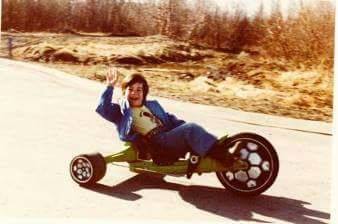
- Freddy Beans
